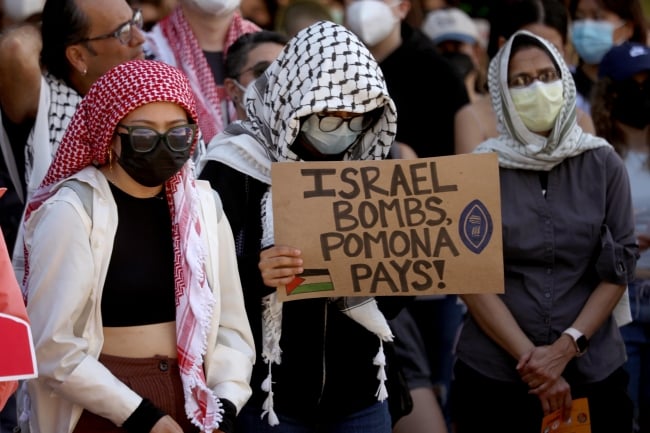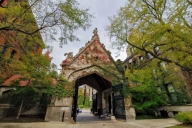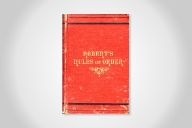You have /5 articles left.
Sign up for a free account or log in.

More than 200 students participated in an April 11 rally calling for Pomona College to divest from Israel and protesting the recent arrests of 20 students who took over the president’s office earlier this month.
Genaro Molina/Los Angeles Times via Getty Images
Six months after the Israel-Hamas war set off a new wave of campus activism in the United States, students are still protesting in full force. And at some institutions administrators are responding to student demonstrators—especially supporters of Palestinians—with increasingly harsh discipline.
In late March, Vanderbilt University police arrested four students and a local journalist after protesters took over the chancellor’s office, demanding the administration restore an Israeli divestment-related amendment removed from the student government ballot. Three students were subsequently expelled and others received suspensions or disciplinary probation.
Less than two weeks later in California, 20 students were arrested at Pomona College—and some have since been suspended—after masked protesters from the Pomona Divest from Apartheid coalition stormed the president’s office and allegedly hurled a racial slur at an administrator.
And on Saturday, the Students for Justice in Palestine chapter at Rutgers University at New Brunswick said in a statement that it was cancelling a walkout “in solidarity and remembrance of the people of Gaza who no longer have any universities left,” planned for Monday, after administrators reportedly warned them of possible suspension or even expulsion if the protest went forward.
In some ways, the actions of the students and the college administrators resemble campus climates during the Civil Rights Movement, Vietnam War and the apartheid era in South Africa, among other eras of social upheaval. What has changed, however, is the pressure politicians and donors now exert on college leaders to support a particular viewpoint.
‘Outside Pressures’
“The outside pressures are real, larger than they’ve been in my memory and are going to continue to build,” said Tom Ginsburg, a law professor at the University of Chicago and faculty director of the university’s Forum for Free Inquiry and Expression. He noted that incidents of students shouting down campus speakers with whom they disagree in recent years is part of the larger context.
“That’s been building and it’s changed the academic culture in a bad way,” Ginsburg said. “We’re seeing some backlash against that and university leaders are caught in the middle.”
The intensified pressure on university leaders is likely to be on display Wednesday on Capitol Hill, where Minouche Shafik, president of Columbia University, and the co-chairs of its Board of Trustees will testify before the House Education and Workforce Committee about the university’s response to antisemitism.
The presidents of the University of Pennsylvania, the Massachusetts Institute of Technology and Harvard University testified before the same committee in December, and were criticized for equivocating on questions about whether calls for the genocide of Jewish people violated university code of conduct policies.
By January, Penn and Harvard’s presidents had resigned.
“Politicians, having gotten two Ivy League university presidents fired, see great merit in keeping this issue alive and are using the moment to turn to other longstanding goals, one of which is attacking DEI bureaucracies,” Ginsburg said. “The issue now is well beyond Israel and Palestine. It has to do with whether universities can actually govern ourselves in ways that accomplish our mission or if we will be continually subjected to restrictions from the government along with the other pressures we face from society.”
In the lead-up to Columbia’s turn in the hot seat this week, Columbia earlier this month suspended students who held an unauthorized panel discussion called “Resistance 101” that featured speakers from the pro-Palestinian groups Within Our Lifetime, Masar Badil and the Samidoun Palestinian Prisoner Solidarity Network.
Shafik, Columbia’s president, said in a statement that the speakers are “known to support terrorism and promote violence,” characterizing the event as “an abhorrent breach of our values.”
“I did not become a university president to punish students,” Shafik said. “At the same time, actions like this on our campus must have consequences.”
It’s not the first time Columbia has cracked down on student protesters this year. It suspended two student groups, Students for Justice in Palestine and Jewish Voice for Peace, in November after the groups held a walkout.
Even still, the university’s response to campus antisemitism is under investigation, not only by the House committee but also by the U.S. Department of Education’s Office for Civil Rights, which is also investigating numerous other institutions.
We’re seeing the suspensions and arrests, with universities throwing the book at students to make sure this doesn’t happen again.”
Zachary Greenberg, senior program officer of campus rights advocacy at the Foundation for Individual Rights and Expression
And while some of the most vocal outside critics of Columbia and other institutions are focused on addressing campus antisemitism, students on both sides of conflict are living in fear.
More than half of Jewish and Muslim students, and a fifth of all college students, reported feeling unsafe on campus because of their stances on the Israeli-Palestinian conflict, according to a recent report from the University of Chicago Project on Security and Threats.
Although the majority of campus protests this academic year have been peaceful, a handful have gotten aggressive.
“In November and December there were a lot of slaps on the wrist, probations and warnings,” said Zachary Greenberg, senior program officer of campus rights advocacy at the Foundation for Individual Rights and Expression. But as the months have worn on, “we’re seeing the suspensions and arrests, with universities throwing the book at students to make sure this doesn’t happen again.”
He added that looming commencement ceremonies may also be contributing to the increased discipline of protesters.
“These are huge events universities use to show off their prestige to donors, parents and students,” he said. “They may be trying to get ahead of groups planning protests during commencement by cracking down in April so that in May students will think twice about using these kinds of tactics during these events.”
Greenberg noted that the severity of punishment for protests depends on the circumstance, but bringing protests indoors—as students did at Vanderbilt and Pomona—increases the chances of them becoming destructive, and devolving into unprotected speech.
In January, American University banned indoor protests, citing “recent events and incidents on campus [that] have made Jewish students feel unsafe and unwelcome." Harvard also started the semester by reminding students that indoor protests are not permitted.
“In general, we agree with universities that when the conduct is especially violent and pervasive and students are deliberately violating university rules, schools will be more justified in inflicting greater punishment,” Greenberg said. “But when the university does take into account the students’ viewpoint or ideas when punishing, that would be a free speech violation.”
At Vanderbilt, where some student protesters were arrested and are not facing expulsion, probation or disciplinary probation, that’s the debate the campus is engaged in right now.
The university will take action when our policies are violated, the safety of our campus is jeopardized and when people intimidate or injure members of our community.”
Daniel Diermeier, chancellor of Vanderbilt University
Free Speech Violation or Safety Concerns?
After the Vanderbilt student protesters allegedly assaulted a community service officer and shoved staff members during their takeover of Chancellor Daniel Diermeier’s office, Diermeier defended the decision to arrest some of them.
“Dozens of peaceful demonstrations have occurred over the past several months. In consideration of safety and the university’s normal operations, we, as a matter of policy, define time, place and manner limitations,” he said. “The university will take action when our policies are violated, the safety of our campus is jeopardized and when people intimidate or injure members of our community.”
But students, faculty and local politicians say the punishments were too harsh.
“(T)he administration’s response to student activism on this issue is inconsistent with Vanderbilt’s commitment to free speech and expression in a democratic society,” said an open letter signed by more than 100 faculty members to Diermeier and other university leaders, calling for a reversal of the suspension and expulsion of protesters. “We also contend that the criterion that student protests must not ‘disrupt’ university operations is perniciously vague and expansive.”
Tori Porell, an attorney for Palestine Legal, an advocacy group that defends supporters of Palestine, said the harsh discipline works to further silence students who were protesting for a chance to vote on a referendum that would have prevented spending student government funds to purchase goods or brands deemed complicit in supporting Israel’s war efforts.
“By tying up dozens of students with burdensome disciplinary proceedings, the students are effectively prevented from pursuing their original aim,” Porell said in an email. “The students at Vanderbilt were extremely confident that their resolution would pass, but now their energy is diverted elsewhere, which is exactly what the University wants.”
Shawn Reilly, a Vanderbilt alum who uses they/them pronouns, told The Tennessean last week that past student activists were treated differently when they staged a sit-in in at Kirkland Hall in 2016 to demand Vanderbilt’s designation as a “sanctuary campus” in light of president-elect Donald Trump’s proposed immigration policies. Reilly said those students were permitted to take bathroom breaks and bring food to their event, unlike the protesters in March.
Similarly, in 2015 a group of students marched into Kirkland Hall and hand-delivered a list of demands related to improving racial equity on campus to the chancellor at the time. There were no arrests or suspensions and many of those demands have since been met.
‘Vehicle for Undermining’ DEI?
The political climate has changed since the 2010s, when universities were responding to student protesters’ demands with pledges to expand diversity, equity and inclusion efforts.
But over the past few years, conservative efforts to ban DEI programs in higher education have gained significant traction. And some of those same lawmakers leading the anti-DEI crusade are also strong critics of campus leaders responses to antisemitism in the wake of the war.
“Some of them have jumped on the antisemitism bandwagon and are using antisemitism and the supposed failure by university administrators to deal with it as just another vehicle for undermining the commitment to diversity, equity and inclusion,” said Walter F. Heinecke, an associate professor of education at the University of Virginia and president of the university's chapter of the American Association of University Professors.
Last month in Texas, where DEI offices are banned as of this year, Governor Greg Abbott issued an executive order requiring the state’s colleges and universities to update their free speech policies to include a definition of antisemitism, establish punishments “including expulsion,” and ensure that Palestine Solidarity Committee and Students for Justice in Palestine, specifically, are disciplined if found in violation.
“Universities are starting to go overboard and being influenced by this political climate,” Heinecke said. “Anti-Israeli state policy and anti-Zionism are not the same as antisemitism. If (administrators) made those lines very clear we wouldn’t be having a problem with unequal punishment of pro-Palestinian faculty and student protesters.”
Charles H.F. Davis III, an assistant professor at the University of Michigan’s Center for the Study of Higher and Postsecondary Education, said there’s another subtext within the long history of universities disciplining campus activists.
“Who’s doing most of the protesting? Overwhelmingly it’s students of color—Black students in particular—and at this moment we see a lot of Arab and Palestinian students,” he said. “You can’t have an institution that espouses a commitment to democratic representation and political engagement that doesn’t provide and hold space for political dissent.”
Political dissent had been building on the campus of Pomona College for months, according to a statement by the college.
“Unidentified, masked individuals have repeatedly disrupted and/or forced the cancellation of events on our campus since October 2023,” the statement said. “Our response has been graduated, with repeated warnings and reminders of policy.”
On April 5, campus activists protested the college’s removal of a student-erected wall that displayed phrases such as “Apartheid College; We are all Complicit,” before taking over the president’s office.
The college said it gave students several opportunities to leave before police from multiple jurisdictions, wearing riot gear, were called in, according to the Claremont Courier.
“While we understand that disruption is a goal of protest, we also need to ensure the safety of our community due to the risk caused by unidentifiable individuals protesting on our campus,” the college’s statement on the incident said.
The Pomona activists, like those at Vanderbilt, have protested the college’s response and called on it to drop the suspensions.
“We no longer feel safe walking around our campus, much less conducting student activism to make our voices heard,” said an open letter signed by dozens of student tour guides. The authors reminded the administration that “over 80% of the protesters” facing disciplinary action are Black, Indigenous people of color. “(A)nd thus sending in police to a school that prides itself on its diverse student body was a horrific and dangerous decision.”
But Philip G. Altbach, a professor emeritus at the Center for International Higher Education at Boston College who was involved in campus activism at the University of Chicago in the 1960s, believes some of the rowdier protests this year have gone too far.
“There’s no excuse for disrupting the normal function of universities with student protest however justified the cause,” he said. “Of course, the right wing is delighted because they can bash the universities which they see as hotbeds of wokeism.”








